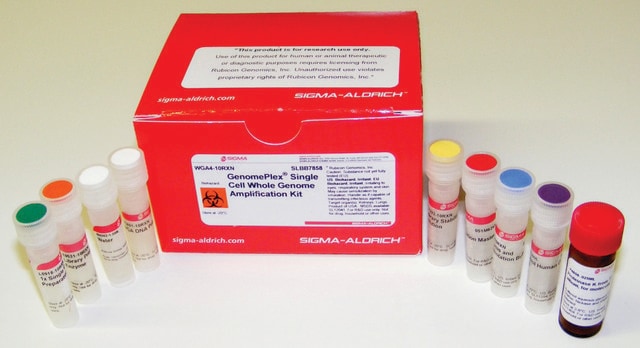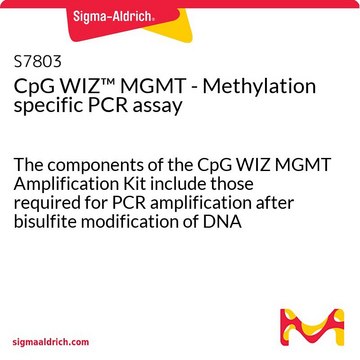S7830
CpG WIZ™ BRCA1 -Methylation specific PCR assay
Methylation-specific PCR (MSP), performed using the CpGenome DNA Modification Kit & the CpG WIZ BRCA1 Amplification Kit, permits sensitive detection of altered DNA.
Autenticatiper visualizzare i prezzi riservati alla tua organizzazione & contrattuali
About This Item
Codice UNSPSC:
12161503
eCl@ss:
32161000
NACRES:
NA.84
Prodotti consigliati
Livello qualitativo
Reattività contro le specie
human
Produttore/marchio commerciale
CPGWIZ™
Chemicon®
tecniche
PCR: suitable
N° accesso NCBI
N° accesso UniProt
applicazioni
genomic analysis
Condizioni di spedizione
dry ice
Informazioni sul gene
human ... BRCA1(672)
Descrizione generale
Methylation of cytosines located 5′ to guanosine is known to have a profound effect on the expression of several eukaryotic genes (1). In normal cells, methylation occurs predominantly in CG-poor regions, while CG-rich areas, called CpG islands, remain unmethylated. Aberrant methylation of normally unmethylated CpG islands has been documented as a relatively frequent event in immortalized and transformed cells (2) and has been associated with transcriptional inactivation of defined tumor suppressor genes in human cancers (3). BRCA1 is a tumor suppressor gene in familial breast-ovarian carcinoma syndrome and in sporadic ovarian carcinomas. In normal breast epithelial cells, BRCA1 mRNA levels in tumors appear to be down-regulated by methylation, while BRCA2 shows significant over expression in sporadic breast cancers. Epigenetic hypermethylation of the BRCA1 gene plays an important role when it is expressed at reduced levels in breast and ovarian tumors as a result of hypermethylation of its promoter region (5,6,7).
Previously developed methods to determine the methylation status of cytosine include digestion with methylation sensitive restriction enzymes and genomic DNA sequencing. Both techniques have limitations: restriction enzymes can only detect methylation sites within their recognition sequence and sequencing is time consuming. Increasing the detection sensitivity of CpG island methylation has the potential to define tumor suppressor gene function and provides a new strategy for early tumor detection.
Methylation-specific PCR (MSP) is a new technology for sensitive detection of abnormal gene methylation utilizing small amounts of DNA (4). This process employs an initial bisulfite reaction to modify the DNA, followed by PCR amplification with specific primers designed to distinguish methylated from unmethylated DNA. The CpGenome DNA Modification Kit (Cat. No. S7820) contains the reagents necessary to perform the initial bisulfite reactions, while the CpG WIZ BRCA1 Amplification Kit contains the reagents required for the PCR amplification reactions.
Previously developed methods to determine the methylation status of cytosine include digestion with methylation sensitive restriction enzymes and genomic DNA sequencing. Both techniques have limitations: restriction enzymes can only detect methylation sites within their recognition sequence and sequencing is time consuming. Increasing the detection sensitivity of CpG island methylation has the potential to define tumor suppressor gene function and provides a new strategy for early tumor detection.
Methylation-specific PCR (MSP) is a new technology for sensitive detection of abnormal gene methylation utilizing small amounts of DNA (4). This process employs an initial bisulfite reaction to modify the DNA, followed by PCR amplification with specific primers designed to distinguish methylated from unmethylated DNA. The CpGenome DNA Modification Kit (Cat. No. S7820) contains the reagents necessary to perform the initial bisulfite reactions, while the CpG WIZ BRCA1 Amplification Kit contains the reagents required for the PCR amplification reactions.
Principles of the Technique:
Methylation-specific PCR (MSP), performed using the CpGenome DNA Modification Kit and the CpG WIZ BRCA1 Amplification Kit, permits sensitive detection of altered DNA. Because this is a PCR-based assay, it is extremely sensitive, facilitating the detection of low numbers of methylated alleles and the study of samples containing small amounts of DNA. MSP also allows examination of all CpG sites, not just those with BRCA1 sequences recognized by methylation sensitive restriction enzymes. Increasing the number of such sites that can be assessed allows rapid, fine mapping of methylation patterns throughout CpG regions. In addition, the bisulfite modification is ideally suited for analysis of CpG islands since it converts the majority of cytosines to uracils, making a region of the genome that is CG-rich less difficult to amplify by PCR.
MSP employs an initial bisulfite reaction to modify the DNA, followed by a "hot start" PCR amplification with specific primers designed to distinguish methylated DNA from unmethylated DNA. As shown in Figure 1, in the bisulfite reaction, all unmethylated cytosines are converted to uracils while 5-methylcytosines remain unaltered. Thus, the sequence of the treated DNA will differ if the DNA is originally methylated vs. unmethylated. Primers contained in the CpG WIZ BRCA1 Amplification Kit are designed to specifically amplify each of the sequences based upon these chemically-induced differences. If the sample DNA was originally unmethylated, a product will be generated after PCR using the U primer set. Conversely, a product will be generated using the M primer set if the sample was originally methylated.
Methylation-specific PCR (MSP), performed using the CpGenome DNA Modification Kit and the CpG WIZ BRCA1 Amplification Kit, permits sensitive detection of altered DNA. Because this is a PCR-based assay, it is extremely sensitive, facilitating the detection of low numbers of methylated alleles and the study of samples containing small amounts of DNA. MSP also allows examination of all CpG sites, not just those with BRCA1 sequences recognized by methylation sensitive restriction enzymes. Increasing the number of such sites that can be assessed allows rapid, fine mapping of methylation patterns throughout CpG regions. In addition, the bisulfite modification is ideally suited for analysis of CpG islands since it converts the majority of cytosines to uracils, making a region of the genome that is CG-rich less difficult to amplify by PCR.
MSP employs an initial bisulfite reaction to modify the DNA, followed by a "hot start" PCR amplification with specific primers designed to distinguish methylated DNA from unmethylated DNA. As shown in Figure 1, in the bisulfite reaction, all unmethylated cytosines are converted to uracils while 5-methylcytosines remain unaltered. Thus, the sequence of the treated DNA will differ if the DNA is originally methylated vs. unmethylated. Primers contained in the CpG WIZ BRCA1 Amplification Kit are designed to specifically amplify each of the sequences based upon these chemically-induced differences. If the sample DNA was originally unmethylated, a product will be generated after PCR using the U primer set. Conversely, a product will be generated using the M primer set if the sample was originally methylated.
Applicazioni
Methylation-specific PCR (MSP), performed using the CpGenome DNA Modification Kit & the CpG WIZ BRCA1 Amplification Kit, permits sensitive detection of altered DNA.
Componenti
The components of the CpG WIZ BRCA1 Amplification Kit include those required for PCR amplification after bisulfite modification of DNA samples. Sufficient reagents are provided to analyze 25 samples with appropriate controls.
U Primer Set7.5 μM each primer (25X) / 35 μL (clear cap) / 90645 / -15°C to -25°C
M Primer Set7.5 μM each primer (25X) / 35 μL (red cap) / 90646 / -15°C to -25°C
W Primer Set7.5 μM each primer (25X) / 35 μL (green cap) / 90647 / -15°C to -25°C
U control DNA0.1 μg/μL / 50 μL (clear cap) / 90393 / -15°C to -25°C
M control DNA0.1 μg/μL / 50 μL (red cap) / 90394 / -15°C to -25°C
W control DNA0.05 μg/μL / 50 μL (green cap) / 90395 / -15°C to -25°C
Universal 10X PCR Buffer / 265 μL (blue cap) / 90396 / -15°C to -25°C
U Primer Set7.5 μM each primer (25X) / 35 μL (clear cap) / 90645 / -15°C to -25°C
M Primer Set7.5 μM each primer (25X) / 35 μL (red cap) / 90646 / -15°C to -25°C
W Primer Set7.5 μM each primer (25X) / 35 μL (green cap) / 90647 / -15°C to -25°C
U control DNA0.1 μg/μL / 50 μL (clear cap) / 90393 / -15°C to -25°C
M control DNA0.1 μg/μL / 50 μL (red cap) / 90394 / -15°C to -25°C
W control DNA0.05 μg/μL / 50 μL (green cap) / 90395 / -15°C to -25°C
Universal 10X PCR Buffer / 265 μL (blue cap) / 90396 / -15°C to -25°C
Note legali
CHEMICON is a registered trademark of Merck KGaA, Darmstadt, Germany
CPGWIZ is a trademark of Merck KGaA, Darmstadt, Germany
Esclusione di responsabilità
Unless otherwise stated in our catalog or other company documentation accompanying the product(s), our products are intended for research use only and are not to be used for any other purpose, which includes but is not limited to, unauthorized commercial uses, in vitro diagnostic uses, ex vivo or in vivo therapeutic uses or any type of consumption or application to humans or animals.
Codice della classe di stoccaggio
10 - Combustible liquids
Certificati d'analisi (COA)
Cerca il Certificati d'analisi (COA) digitando il numero di lotto/batch corrispondente. I numeri di lotto o di batch sono stampati sull'etichetta dei prodotti dopo la parola ‘Lotto’ o ‘Batch’.
Possiedi già questo prodotto?
I documenti relativi ai prodotti acquistati recentemente sono disponibili nell’Archivio dei documenti.
Il team dei nostri ricercatori vanta grande esperienza in tutte le aree della ricerca quali Life Science, scienza dei materiali, sintesi chimica, cromatografia, discipline analitiche, ecc..
Contatta l'Assistenza Tecnica.








